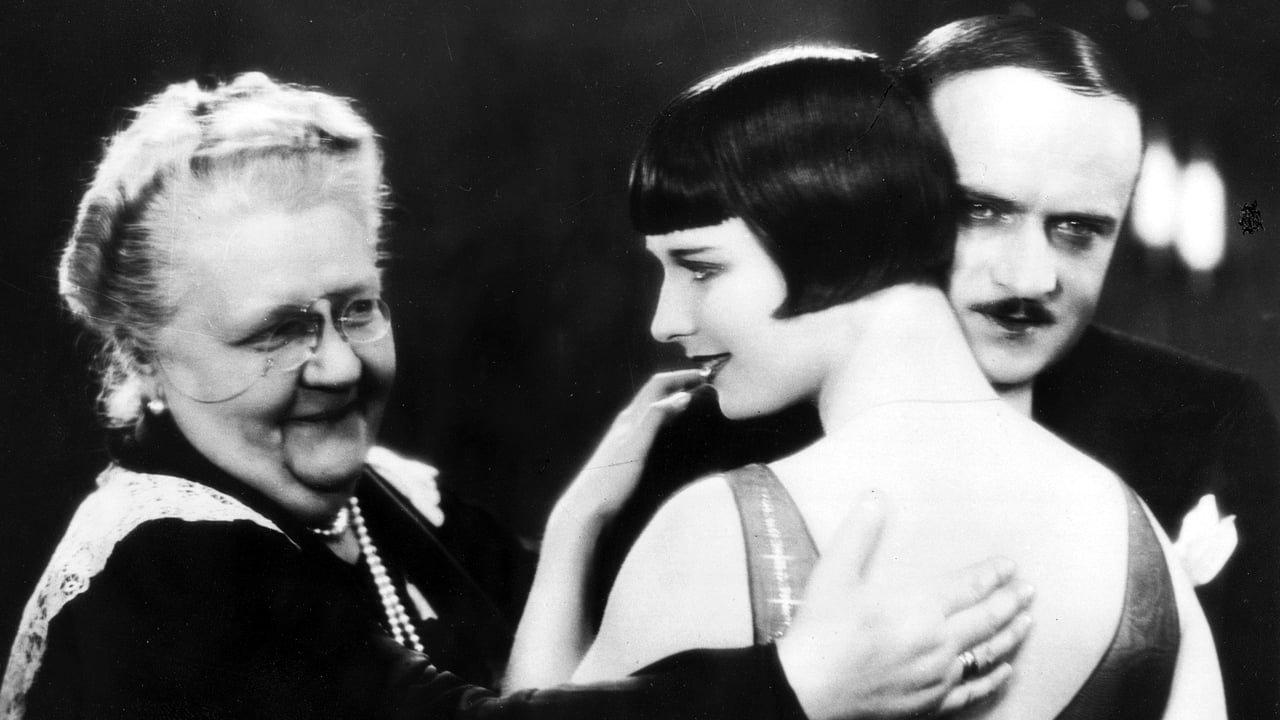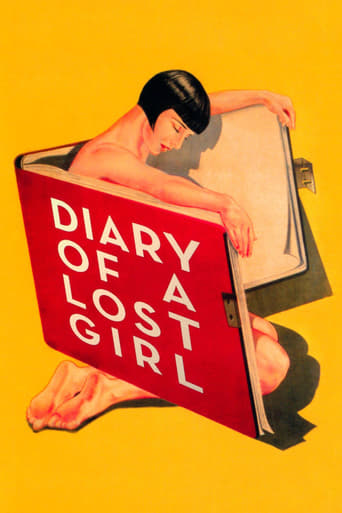

"Tagebuch einer Verlorenen" or "Diary of a Lost Girl" is a German movie from 1929 and this is still a time when silent black-and-white films like this one dominated the industry, even if it was not a long way to go anymore until the sound era thrived. The director here is Georg Wilhelm Pabst, one of the most respected movie makers from that era and the title character is played by his muse, lead actress Louise Brooks, once again. The writer is Rudolf Leonhardt and it is probably his most known work. Here he adapted a novel by writer Margarethe Böhme for the big screen, even if it was not the first time this novel was adapted. The version from 10 years earlier, however, is entirely forgotten today compared to Pabst's more recent work from four years before Nazis came into power. My opinion here is that the film stands and falls with how much you can identify and care for the main character. And sadly I must say that I almost did not care for her at all, during the entire film. I am not sure if the reason is the script or Brooks' performance, maybe a mix of both. She is a prime example of an actress who was a huge star during the silent era, but did not manage the transition into sound films. Then again, looking at how I perceived her here, I cannot say this is much of a loss, at least for me. Finally, a word about the film poster: I guess this must have been almost scandalous back then, a naked (implied!) woman inside a book. I doubt this could have been made 10 years later. But it did not have to. I do not recommend the watch.It dragged a lot for me and I do not recommend the watch.
... View MoreIt isn't difficult to see why Georg Wilhelm Pabst's Diary of a Lost Girl caused a bit of a headache for the censors back in 1929. Even for a movie made during the Weimar Republic era, a revolutionary time for cinema when directors were consistently pushing the boundaries with controversial tales of debauchery and Germany's seedy underbelly, the themes and social insight feel unnervingly modern. Teaming up once again with his muse Louise Brooks, the Kansas-born starlet plays Thymian, the naive daughter of a wealthy pharmacist who, in the opening scene, watches their maid leave the family home in shame when Thymian's father (Josef Rovensky) gets her pregnant.Although it's clear to the audience, Thymian is puzzled as to why the girl has left. Her father's assistant, the creepy and much older Meinert (Fritz Rasp), invites her to the pharmacy that night on the promise to tell her everything, but instead takes advantage of the young girl and gets her pregnant. When the baby arrives, Thymian refuses to reveal who the father is but her family learn the truth from her diary, and insist that the two marry to avoid damage to the family's reputation. When she refuses, Thymian's baby is taken from her and she is packed off to a reformatory watched over by the intimidating director (Andrews Engelmann) and his tyrannical wife (Valeska Gert). After rebelling against the school, Thymian and a friend escape and join a brothel,Like many films made during the Weimar era, Diary of a Lost Girl depicts the decay in almost every aspect of German society at the time. The lives of the rich are stripped bare, and their motivations are heavily questioned when the family send Thymian away not with her 'rehabilitation' in mind, but simply to save face. The reformatory itself is a cold and bleak place, where the director's wife bangs a rhythm for the inhabitants to rigidly eat their soup too. They are less concerned with helping the girls fit back into the society that has failed them, and more about satisfying their own sadistic desires. In one particularly effective close-up, the wife seems to be achieving some sort of sexual gratification from her monstrous behaviour.The one place Thymian feels accepted on any sort of level is the brothel, a place where she can be herself without any kind of judgement or fear of social exile. While Thymian can at times be frustratingly naive and swoonish whenever she finds herself in the arms of a man, Louise Brooks delivers a tour de force performance that helps the audience maintain sympathy for her put-upon character, even when the film is at its most melodramatic. Even though the film is now 87 years old, Brooks's acting feels completely modern. Where most silent actors switch between rigid and operatic in their performances, Brooks is naturalistic and subtle, making it clear just why Pabst was so eager to work with her again after Pandora's Box, made the same year.
... View MoreThe teenager Thymian Henning (Louise Brooks) lives with her father Karl Friedrich Henning and her aunt in a comfortable house. When the pregnant housekeeper Elisabeth (Sybille Schmitz) is fired, she commits suicide and is found drowned. Her father brings the new housekeeper Meta (Franziska Kinz) and sooner he flirts with her. Thymian is seduced by the pharmacist Meinert (Fritz Rasp) that rents her father's pharmacy downstairs. Thyamin gets pregnant and her father gives the baby Erika for a nanny and puts his daughter in a reformatory. Meanwhile, the idle Count Nicolas Osdorff (André Roanne) is left by his uncle to fend for himself. Karl Henning gets married with Meta and Thymian decides to escape from the boarding school helped by Count Osdorff.During the night, Thymian runs away from the reformatory with a friend that gives an address to Thymian and the Count. Sooner she finds that the place is a brothel and without any alternative to survive, she works in the place. Years later, her father dies and Thymian inherits everything. But she needs a new identity and she gets married with the Count and becomes a Countess. However, when she sees her little sister leaving the house with her little brother and Meta, she gives her fortune to the child. When Count Osdorff discovers that she had given up the fortune, he commits suicide. Now the Elder Count Osdorff (Arnold Korff) feels responsible for the death of his cousin and promises to assist Thymian to have a better life. But she is still haunted by her past. "Tagebuch einer Verlorenen", a.k.a. "Diary of a Lost Girl", is a masterpiece from Georg Wilhelm Pabst with a complex story of a teenager that has her life destroyed by the intolerance of her family after an irreparable mistake in the view of a 1929 society.The plot has many twists and subtle scenes, like the debut of Thymian in the brothel with the client kissing her and turning off the lampshade. Louise Brooks is among the most beautiful faces of the cinema history and her acting is stunning as usual. The Count's last sentence "- with a little more love, no one on this Earth would ever be lost!" closes this film with golden key. My vote is nine.Title (Brazil): "Diário de uma Garota Perdida" ("Diary of a Lost Girl")
... View More"Diary of a lost girl" - the second film adaptation of the novel, supposedly based on a true story, the writer of the last century, Margaret Bome. Received by the press in 1905, is the most famous and best-selling book of women. By the end of the twentieth of its sales has exceeded more than a million copies, making the novel one of the top bestsellers of its time. One modern scholar has called "Diary of the Fallen" "Perhaps the most notorious and, of course, commercially the most successful autobiographical story of the early twentieth century.Literary sensation. According to the author tells the true story of a young woman forced into prostitution circumstances. At the time of publication, believed to be an authentic book is a diary, but argued only Bome that was its editor. Likewise there has been the emergence of the myth of some novel effects on social reform at the time.The first screening took place in 1918, director Richard Oswald «Das Tagebuch Einer Verlorenen». To date, the film is considered "lost" and no one in the audience has no opportunity to see it.The second film adaptation was the work of the so-called "historic duet" Georg Wilhelm Pabst filmmaker and an American actress Louise Brooks. According to rumors, he asked her did not even know, seeing only her picture with a charming and powerful features, a mysterious look. That same year she appeared before him in a few ambiguous psychological drama "Pandora's Box." Both films are emblematic of the German cinema of the late twenties and this despite the fact that the young Brooks at home in the states acted in film punchings, second-rate bands, however, after the Commonwealth with Pabst has signed a lucrative contract with film company «Paramount».Their duet was a success for both of them. Brooks joined the amazing image of her heroine, expressing regret and despair with a rare subtlety of nature, while Pabst reel filled with memorable, vibrant and accentuate the culmination of events moments, particularly a scene in a brothel, where circling in the dance of prostitutes and their clients share a daughter and a fallen selfish father in a sudden encounter. The story itself, as the film is filled with meaningful scenes. In the episode where the assistant girl's father clings to Meyner Thyme, after which the heroine of Louise Brooks, faints and he was a "dirty" smile carries her into his bedroom, symbolizes the suppression of pure kindness naive girl in front of vicious evil bastard lust. Georg Wilhelm Pabst film can also be partly compared with the early work of director Charles Chaplin. One of the scenes of the film in the penitentiary, which enters the main character, is very ironic and ambiguous context. Girls taking place in this institution re-education, and in fact every day tolerate violent attitude on the part of both the moral and ugly teachers, arrange one evening in a dormitory rebellion, lashing out at their supervisors throughout the crowd with his fists. Similar scenes are in movies of Chaplin, it is in his films where he played the director, when he kicked his foot heroes stupid and evil members of the order, thus showing their relationship to government authorities at the time as a whole, whose policies have complicated the lives of many people."Diary of the Fallen" - a psychological drama with realistic events, which is a blow to the selfish bourgeois society in the face of vicious character depicted in the film. The story of the preservation of resilience, kindness, courage, compassion, and love the girl, despite all the troubles through which she had to go through.
... View More